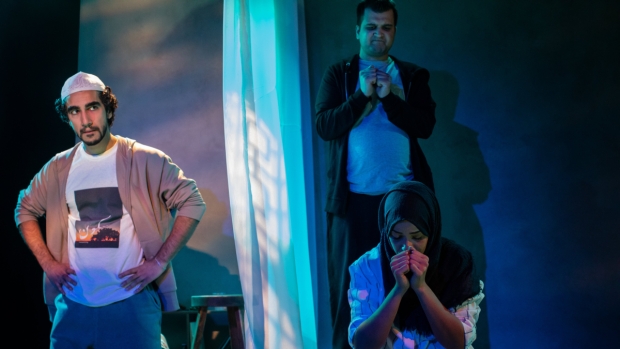
© Ali Wright
Shahid Iqbal Khan's script, in this Graeae, Tamasha and Bush co-production, has had an interesting genesis. According to a programme note, it was conceived as "a one man play with two people playing the same character" but during rehearsals it evolved into a three-person cast, and acquired the commendably inclusive elements of BSL, captions and audio description. If the result feels a little unfocused, never quite taking wing as a drama nor provoking a potent enough emotional response, it's still a captivating piece of storytelling, featuring a community that remains underrepresented on stage, and it has a lovely heart.
Zaqi Ismail narrates as Yasser, a streetwise young man struggling to reconcile a modern urban lifestyle with his traditional Muslim roots, and much of the piece's comedy derives from the push and pull of that apparently unsolvable conflict. Sumayya Si-Tayeb (at press night; Chandrika Gopalakrishnan also alternates in the role) is a compelling, vivid presence alongside Ismail, simultaneously performing the text in BSL, occasionally abandoning her signing to gaze in comic disbelief at some of Yasser's exploits.
Yasser is going through his first Itikaf, the final ten nights of Ramadan when the devoted take to the mosque full time for an extended period of ibadah (worship and contemplation of Allah), to the immense pride of his traditionalist father (lovingly caricatured by Ismail, who has the natural comedy instincts and easy charm of a true clown). While the participants in Itikaf are supposed to be cut off from the outside world for that ten-day period, Yasser is haunted by the too-young death of a long-standing friend, and has demons of his own. This makes him a somewhat unreliable narrator which gives the drama a certain piquancy, although it could cope with having even more, and more clarity.
Despite this, the revelation that one's first impression of some of the characters Ismail skilfully morphs into may not have been entirely accurate, as filtered through Yasser's somewhat skewed perception, is a fascinating one. Also, the redemption and forgiveness that come at the end of the play feel genuinely earned, and prove affecting and uplifting.
Elsewhere, Kash Arshad's production is consistently engaging, even if it suffers from an overabundance of ideas crossed with a scarcity of resources. Using a third performer, Safyan Iqbal, to represent the deceased Aftab, feels, despite the actor's gentle, warm gravitas, a little ponderous when it should be transporting. Also, Ismail has a tendency to throw away some of the more serious moments, seeming more at home with the comedy.
I wonder if 10 Nights might have been more effective had all the disparate elements been in place from the ground up, rather than being added during the rehearsal process (for example, in the printed script both male actors are listed as playing Yasser, which would probably have made for quite a different take on the character). Regardless of all that, Khan is clearly a talented writer, capable of accurately striking contrasting notes and with a keen sense of the speech idiosyncrasies of a wide variety of characters, and it is heartening to see a piece of theatre that is so determined to be inclusive and outside the conventional box.












